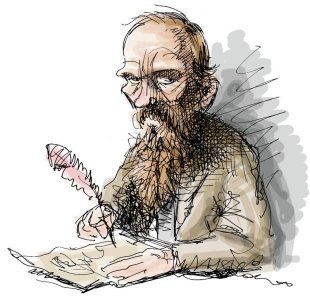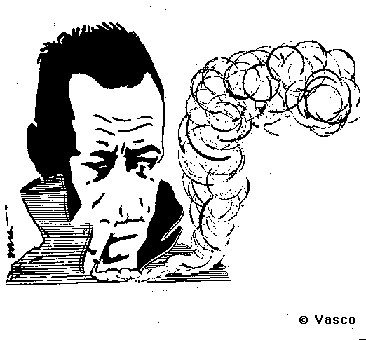Soren Kierkegaard (1813 - 1855) has been accused of being the father of
existentialism. This is true, in a way, but K's existentialism (which he wouldn't have recognized as such) is a far cry from the atheistic existentialism which unfolded after him in the twentieth century. For he was an ardent Christian, one however who considered the [Lutheran] Church to be an enemy of Christianity, its interest being in the group, the docile flock – the more the better – rather than in the individual.

Soren Kierkegaard“People understand me so little that they do not even understand when I complain of being misunderstood,” he wrote in his journal, which by the way consists of 7,000 pages in twelve volumes – published in English in 1938. So if you want to study Kierkegaard and understand him, there is no lack of material.
The following passage, from 1 August 1835, is perhaps his most oft-quoted aphorism and a key quote for existentialist studies: "What I really need is to get clear about what I must do, not what I must know, except insofar as knowledge must precede every act. What matters is to find a purpose, to see what it really is that God wills that I shall do; the crucial thing is to find a truth which is truth for me, to find the idea for which I am willing to live and die."
Arch-individualism, certainly. The solution of life's mysteries was, for K, faith. I paraphrase from memory, I think from Either/Or. To live means to suffer (Hello Buddha!). Even for a well-to-do Dane like K suffering will always outweigh pleasure. Therefore, for a thinking person, especially a philosopher, what is the point of living? At some point he comes to a crossroads where two different directions are possible. One is trying to find meaning in life without faith. This is impossible, so logically he should commit suicide. The other direction is that of faith. This is dubious, for at the outset one cannot know if faith is justified. But at least there is hope, so the thinking person must choose this path of faith. Kierkegaard did so, and he was rewarded. At least the fictitious person in the story was. His famous “Leap of Faith” analogizes the leap over that abyss of existential despair.
Two of the first literary authors important to existentialism were the Czech Franz Kafka and the Russian Fyodor Dostoyevsky, whose Notes from the Underground portrays a man unable to fit into society and unhappy with the identities he creates for himself. Jean-Paul Sartre, in his book on existentialism Existentialism is Humanism, quoted Dostoevsky's The Brothers Karamazov as an example of existential crisis. He quotes Ivan Karamazov who claims that "If God did not exist, all things would be permitted." Others of Dostoevsky's novels covered issues raised in existentialist philosophy while presenting story lines divergent from secular existentialism.

Fyodor DostoyevskyKafka created surreal and alienated characters who struggle with hopelessness and absurdity, notably in his most famous novella, The Metamorphosis, or in his master novel, The Trial. In his philosophical essay The Myth of Sisyphus, the French existentialist/absurdist Albert Camus describes Kafka's oeuvre as "absurd in principle", but he finds the same "tremendous cry of hope" expressed by religious existentialists such as Kierkegaard —which Camus rejects.
Let's now leap over some of the nineteenth and twentieth century philosophers who are generally considered to be existentialists – Nietzsche, Husserl, Heidegger – and land on the other side, where the existentialists Jean-Paul Sartre and Albert Camus, already mentioned above, reside. Sartre coined the term “existentialism” sometime in the nineteen-forties, so Kierkegaard and Nietzsche never even knew that they were existentialists and might well have strenuously objected to the label had they known. The principal difference between Kierkegaard and Sartre/Camus is that the former was a Christian and the latter were atheists. What makes them all existentialists? I think it is their insistence on the individual making his/her own active choices in a world which is essentially arbitrary and unknowable. One could argue that Descartes was also an existentialist because he posited “Cogito ergo sum” (I think, therefore I am). But that would be a mistake. The existentialist never doubts his own existence – and not only of his mind but of his body, and his physical as well as his psychological needs. He knows he exists and ponders what to do about it and how.
In the realm of literature, Dostoyevsky can certainly be called an existentialist – in the Kierkegaard mold. In The Brothers Karamazov Ivan laments the suffering of children – and goes so far as to reject God for allowing such suffering. But note that he doesn't doubt His existence. His brother Alyosha represents a different aspect of the Karamazov soul – the religious monk who, although also suffering, finally finds comfort and meaning in religious faith, thereby not required to solve the riddle of existence. Also, Raskolnikof in “Crime and Punishment” experiences an existential crisis and then moves toward a Christian Orthodox worldview similar to that advocated by Dostoevsky himself.
Jean-Paul Sartre (1905 - 1980), with a powerful pen, popularized existentialism (to the extent a philosophy can be popularized) after World War II. Turning Aristotle – who preached that man is created to fulfill some purpose – on his head, Sartre claimed that as there is no God (or, according to Nietzsche, God is dead) to give man a purpose, it is up to the individual to choose the life he thinks best.
With Albert Camus (1913 – 1960), a writer of such excellence that he won the Nobel Prize for literature, we arrive full circle to suicide. He considers life to be meaningless and absurd, the absurd ones being us for trying to make sense of a senseless world. Given such a pointless existence in an uncompromisingly irrational world, Camus asks: “Why should I not commit suicide?” It is the inevitable conclusion of existentialism, which he accused the previous existentialist philosophers to have shied away from – although he must have known that Kierkegaard considered it as an option and rejected it. Camus' most important contribution to philosophy is “The Myth of Sisyphus” - in which the protagonist, Sisyphus, is condemned by the gods to push a huge rock up a hill only to have it roll back down again from near the summit, when he must begin again – for all eternity. Camus saw Sisyphus as personifying the absurdity of human life, but concludes that "one must imagine Sisyphus happy as the struggle itself towards the heights is enough to fill a man's heart." So, finally, Camus also rejects the suicide option, albeit in an unconvincing manner. Philosophers never actually commit suicide; they're too busy proving that it's the logical inevitability of their thinking.

Albert Camus
Reincarnation
None of the above philosophers mentions reincarnation, perhaps because they all come from a Christian culture, which in turn derives from Judaism, and neither of these contains reincarnation among its beliefs....apparently. However, the concept of reincarnation is found in Kabbalistic Judaism and even in Shi'a ghulat Muslim sects. The Christian churches reject reincarnation, preferring heaven and hell, but that does not mean that the concept is absent in Christianity or western thought. Christ himself is expected to be reborn, and according to Gnostic theology John the Baptist was a "personification" of the prophet Elijah who, as an Old Testament prophet, did not know the True God (the God of the New Testament), and thus had to be reincarnated, .

As predicted by the Old Testament prophet Malachi, Elijah must "come first" to herald the coming of the Christ. Modern anthroposophy, initiated by Rudolf Steiner, concurs with the idea that the Baptist was a reincarnation of Elijah, in line with the Synoptic Gospels (e.g. Mark 9:11-13, Matthew 11:13-14, Luke 7:27), where Jesus confirms it. However, in the Gospel of John (John 1:21), the Baptist himself denies it when being interrogated by priests and Levites - perhaps as a self-preservation measure. According to Steiner, the painter Raphael and the poet Novalis were more recent incarnations of John the Baptist.
Existentialism and Reincarnation – a marriage of convenience and/or necessity
Existentialist philosophers and writers are simply quitters – as far as their philosophy is concerned at least. They recognize that life and the world are unfathomable. Both Kierkegaard and Dostoyevsky lament the world's injustice and suffering, but their only solution is to have faith in an invisible God and his redeemer son. But Sartre and Camus, along with many members of their generation and the following ones up until today, are so besotted with scientism that they are unable or unwilling to risk that “jump of faith” – one which seems to insult their intelligence. If, after all, faith involves adhering to an organized religion corrupted by politics, unsustainable dogmas or moral decay, who needs it.
Reincarnation is an Eastern concept and existentialism a Western one. Rudyard Kipling famously sang:
Oh, East is East, and West is West, and never the two shall meet,
Till Earth and Sky stand presently at God’s great Judgment Seat;
But there is neither East nor West, Border, nor Breed, nor Birth,
When two strong men stand face to face, tho’ they come from the ends of the earth.Occidental existentialism – along with Walt Whitman – has sung the individual, entreated him to be strong and live life to the full despite the glass darkly surrounding its meaning. Reincarnation, its oriental bride, provides the meaning: evolution of the individual through many lives on earth and, somewhere along the way, justice.
Home
